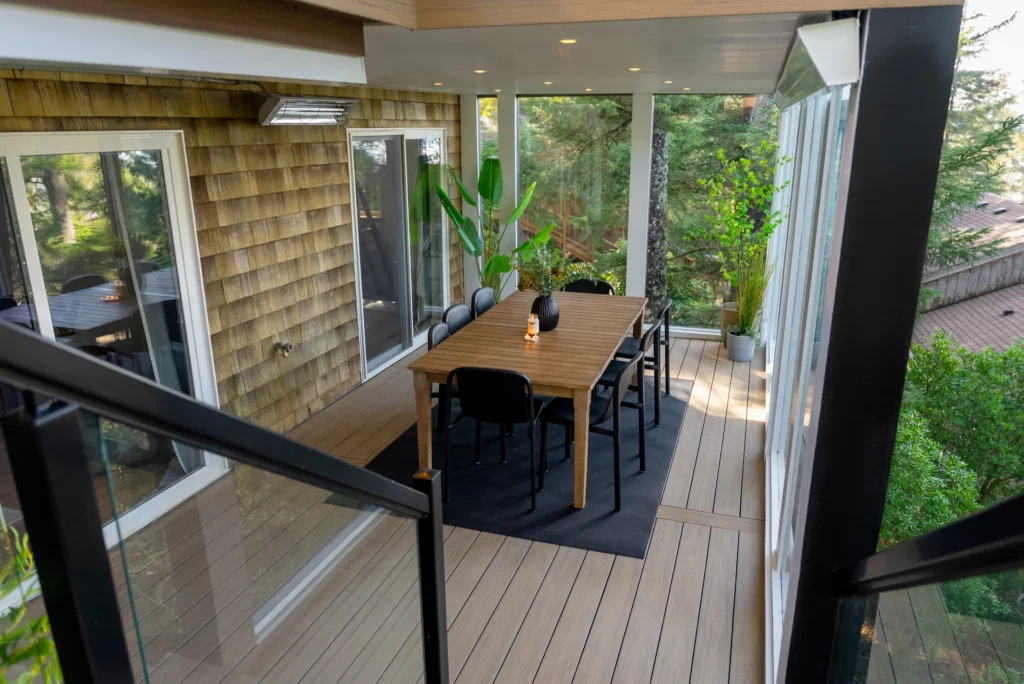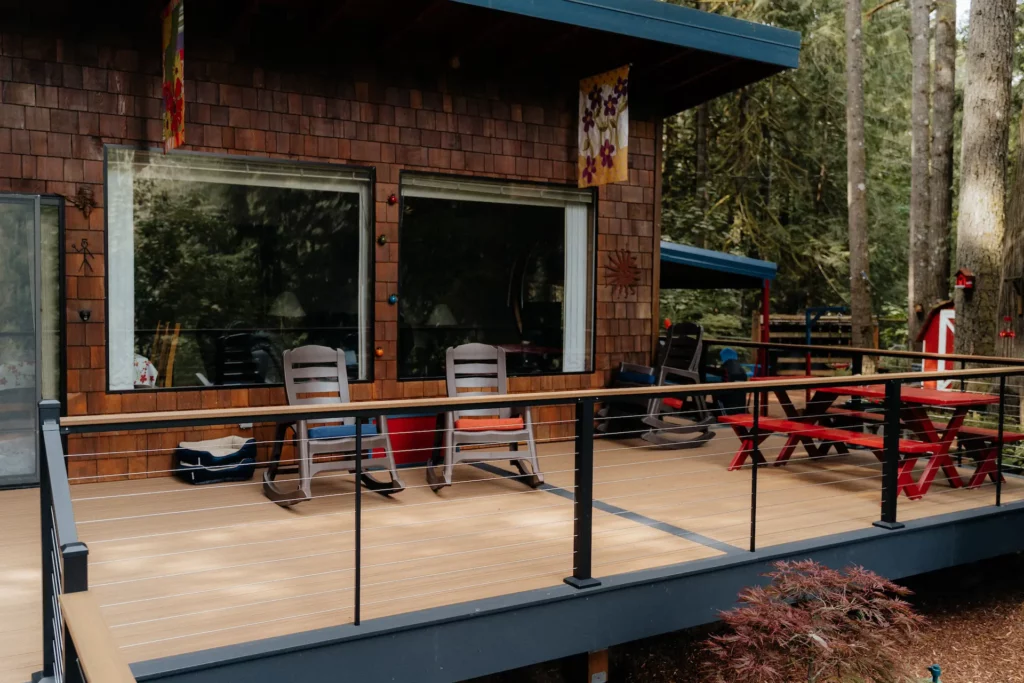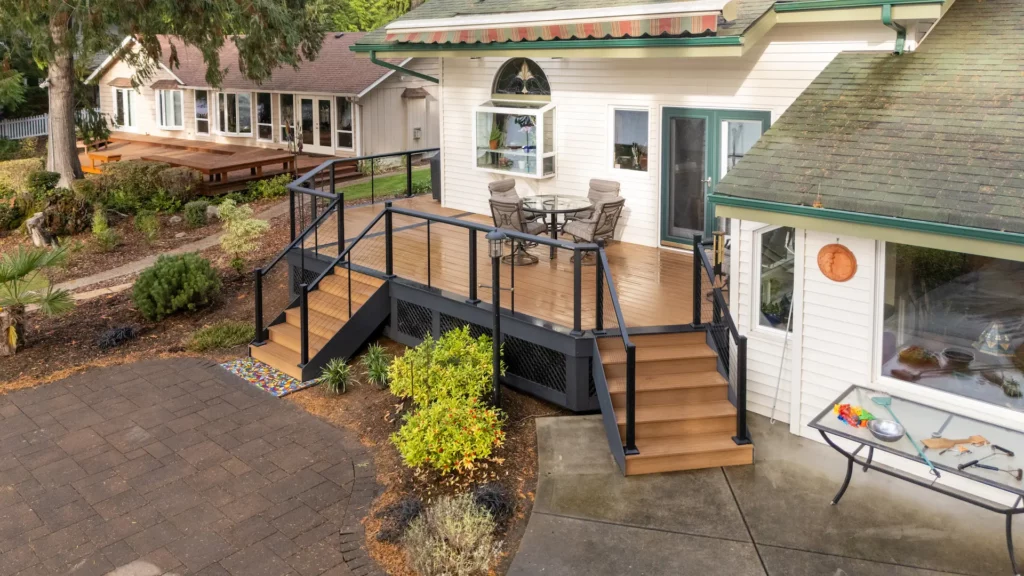We’ve built hundreds of outdoor living spaces around the Portland area, and if there’s one thing we’ve learned, it’s that the best spaces aren’t just built for looks—they’re built to be used. When we design decks, patios, and backyard environments, we always ask: Would we enjoy spending time here?
This article walks you through how we would build an outdoor space if we were doing it for ourselves—function-forward, weather-ready, and designed for comfort. We’ll also share accessory ideas and pricing to help you budget as you build or upgrade your space.
Cook Outside Like You Mean It
We rarely recommend built-in grills anymore. Today’s portable cooking gear looks better, works better, and gives you way more flexibility if your setup changes over time.
Our recommended pizza ovens:
| Tier | Product | Price | Why We Like It |
|---|---|---|---|
| Premium | Ooni Karu 16 | $650 | Propane or wood, digital temp readout, up to 950 °F, easy to store |
| Solid Mid‑Tier | Gozney Roccbox | $500 | Excellent heat retention, very compact and portable |
| Budget | Ooni Karu 12 | $299 | Lightweight, authentic results, works well even in breezy conditions |
For grilling:
We’ve had great results with the Weber Traveler (around $450), which offers full-size performance in a fold-down, wheeled body. If you’re into charcoal, the Nomad Grill (~$599) is built like a tank and holds heat exceptionally well.
We recommend placing grills and ovens over heat shields if you’re cooking on composite decking.

Add a Bar Setup You’ll Actually Use
A lot of customers ask us about outdoor bars. We usually point them toward mobile options that don’t lock you into one layout forever. Here are three we like based on function, durability, and looks.
Top picks for outdoor bars:
Williams Sonoma Chatham Cart (~$4,000) – Real teak and stainless steel, includes ice bin, wine racks, and locking wheels. It’s an investment piece that can live outside for years.
Crate & Barrel Abaco Cart (~$599) – Clean design, powder-coated frame, built-in storage, and FSC-certified wood for weather resistance.
Best Choice Rolling Cooler (~$200) – Holds over 100 cans. Not a design piece, but very practical for larger gatherings.
We recommend keeping these under cover or stored in the garage between uses to extend their life.
Furnish It for Comfort
Whether you’re building a lounge area or setting up an outdoor dining zone, your furniture should feel just as comfortable as what’s inside your house. That means thinking about cushion material, frame type, and layout flexibility.
Here’s what we’d use:
Outdoor sectional with fast-drying cushions: $1,500–$3,000
Teak or powder-coated lounge chairs: $400–$800 each
Cantilever umbrella or retractable sun shade: $200–$1,000
We often build in low-profile privacy screens or small bump-out platforms to help define these spaces.

Sound, Lighting, and Ambiance
Entertainment doesn’t have to mean a full AV install. We usually recommend portable, weather-resistant audio systems and simple, low-voltage lighting that ties into your space without clutter.
Ideas we often suggest:
-
Sonos Roam or Bose Portable Smart Speaker: $180–$300. Great sound, can move inside or outside.
-
Low-voltage lighting or solar-powered string lights: $75–$250 depending on layout size.
During construction, we’re happy to route conduit for future upgrades if you’re planning to add more later. It’s easier to think ahead than retrofit.
Patio Heaters: A Must for Portland Evenings
If we were building a space we planned to use into the evening hours, we wouldn’t skip the heater. Even in July, Portland nights can get chilly fast.
Here’s what we’d recommend:
| Tier | Product | Price | Highlights |
|---|---|---|---|
| High‑End | Bromic Tungsten Smart‑Heat | $2,100 | Sleek look, directional infrared heat, holds up in wind |
| Mid‑Tier | Pyramid Flame Heater | $350 | Visual ambiance and decent warmth for lounge areas |
| Budget | Mushroom‑Style Propane Heater | $150–$200 | Wide heat radius, reliable ignition, easy to store |
These work especially well under covered patios or near wind-protected corners of the deck. For exposed decks, we may recommend a windscreen or corner enclosure to retain more heat.

Designed to Last in Portland’s Climate
When we’re building decks and outdoor spaces here in the Northwest, we plan for moisture, shade, and seasonal temperature shifts. That means:
Protecting hardware from corrosion
Choosing materials that stand up to rain and UV
Ensuring drainage and ventilation under furniture
Recommending covers for grills, cushions, and heaters (and designing spaces where you can store them easily)
We’ve seen too many projects lose value because the wrong materials or accessories weren’t protected properly. These small details make a big difference over time.
Final Thoughts from the Cascade Team
If we were building an outdoor space for ourselves, it would be:
Comfortable enough to use every week
Flexible enough to change with the seasons
Tough enough to handle real weather
And simple enough to maintain
That’s the mindset we bring to every project.
